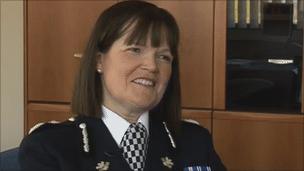Gwent Police: Questions raised by Carwyn Jones over PCC row
- Published

Carmel Napier was told to "retire or be removed" from the Gwent force by its PCC
Questions about why Gwent Police's top officer was ordered to "retire or be removed" by the force's police and crime commissioner need to be answered, Wales' first minister has said.
Carmel Napier retired from the force on 7 June. Days later Gwent PCC Ian Johnston said he had told her to go.
First Minister Carwyn Jones said Mrs Napier's retirement raised questions.
Mrs Napier, who had spent 30 years in policing, announced her retirement with immediate effect last Friday.
Four days later, it emerged that she had been forced out after a series of rows with Mr Johnston.
Mr Johnston - a former chief superintendent in the Gwent force with more than 30 years service - confirmed his ultimatum to Mrs Napier.
It was only revealed after documents were leaked to the South Wales Argus, external.

Ian Johnston insisted he did all he could to try to improve the pair's relationship
He criticised Mrs Napier's management style and said the relationship "was never going to work".
But Mrs Napier fought back with a strongly-worded statement, which urged the government to consider whether crime commissioners' powers were compromising police independence in operational matters.
Mr Johnston's actions have been criticised by MPs with one saying it amounted to bullying.
But the PCC, a former president of the Police Superintendents' Association, insisted that he had adhered to the correct procedures and had "followed the letter of the law absolutely".
First Minister Carwyn Jones said the situation raised "lots of questions that have already been asked by some of the MPs and I think those questions need to be answered".
"The difficulty for police and crime commissioners is that they can promise lots of things but it's difficult to deliver unless you're someone who's very, very active," he said.
"You're relying on a chief constable to deliver what you want on the ground and when you have a scenario like this there are questions that are bound to be asked as to how it came about - what really was the reason behind the chief constable standing down?"
Meanwhile, Sir Hugh Orde, president of the Association of Chief Police Officers, has said he wants to meet Theresa May to discuss the "huge" power granted to PCCs.
He said the current arrangement lacked scrutiny and he branded it "the worst system you can possibly have".
The Home Office said PCCs had given the electorate a "real say" over policing.
- Published14 June 2013
- Published12 June 2013
- Published11 June 2013
- Published11 June 2013
- Published5 June 2013
- Published1 April 2011